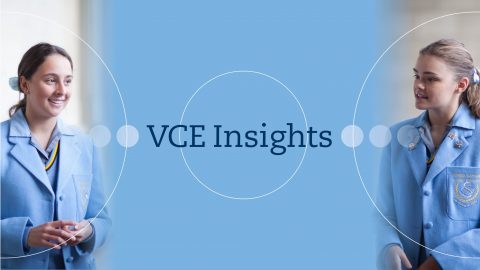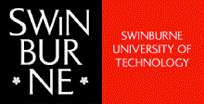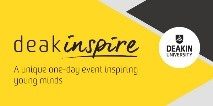VCE Insights

In this edition of VCE Insights, St Catherine’s Head of English, Mrs Ceri Lloyd opens up the world of essay writing and provides some useful tips for students and parents.
You will also find comprehensive updates on current offerings from tertiary institutions across Australia, as well as details on key dates and academic schedules for the upcoming fortnight.
![]()
Monday 21 May: GAT Information Session (Years 11 and 12 students)
Friday 1 June: Year 11 Exams Commence
![]()
Below is a list of subjects with SACs and Outcomes scheduled over the coming weeks.
Please note subject teachers will communicate with your daughter regarding the specific date their SAC or Outcome will run.
Term 2 Week 6
Year 12 SACs
EAL
French
Global Politics
Japanese
Literature
Music Performance
Studio Arts
Theatre Studies
Visual Communication
Year 11 Outcomes
Business Management
Chinese SL/A
Chemistry
EAL
English
French
General Maths
Health
Legal Studies
Literature
Mathematical Methods
Philosophy
Physical Education
Psychology
Specialist Maths
Studio Art
20th Century History
Theatre Studies
Term 2 Week 7
Year 12 SACs
Further Maths
French
Health
History Revolutions
Year 11 Outcomes
Biology
Japanese
Media
Physics
Specialist Maths
![]()
With Year 11 exams only two weeks away and Year 12 SACs continuing, we thought it timely to provide some tips on how to manage stress and anxiety.
This information may be helpful for you and your daughters. The Year 11 students have had a session on Stress Management with Ms Amelia King, our School Psychologist, and the Year 12 cohort have undertaken a session with Mr Brad Felstead on Study Calm.
Helpful ways of coping with stress can include:
- Relaxation – progressive muscle relaxation, yoga, visualisation, meditation and mindfulness
- Utilising social support – family, friends and school support
- Exercise
- Maintaining healthy hobbies
- Organisation and planning – setting realistic goals
- Looking after yourself – eating well, exercise and rest
- Good sleep hygiene is essential (aim for eight hours per night)
Study Calm
The Year 12 girls had a session on study calm and how this can assist students to reduce stress and worry and improve their academic performance.
The topics covered included:
- The negative impact of stress and anxiety on mental and physical wellbeing
- The science of how stress and worry can reduce academic performance
- Practical relaxation strategies including breathing exercises and muscle relaxation techniques, visualisation and positive thinking
- The role of exercise, nutrition and sleep in maintaining optimal physical and mental health
Mrs Melissa Braddy, Head of Year 11 and Miss Jeanette Gunn, Head of Year 12
![]()
“It’s a Rollercoaster. Hold on for the Ride.”
 One cannot underestimate the workload of a VCE student. VCE English is a subject that at St Catherine’s all students must study. This can be a challenge for students who find writing extended essays and close analysis of texts challenging. It is my job to make sure that all students at St Catherine’s feel confident and engaged by their English studies, and perform at their best on their SACs and the end of year examination.
One cannot underestimate the workload of a VCE student. VCE English is a subject that at St Catherine’s all students must study. This can be a challenge for students who find writing extended essays and close analysis of texts challenging. It is my job to make sure that all students at St Catherine’s feel confident and engaged by their English studies, and perform at their best on their SACs and the end of year examination.
In VCE English, students are required to write three very different types of essays.
- The first one is a text analysis essay, focusing on the key ideas and characters in the text.
- The second is a comparative text response essay where students are required to analyse and compare two texts in the one essay in terms of themes and issues.
- The third is an analysis of persuasive language and arguments.
The essay types are challenging and students need to work progressively on the development of their language, ideas, structure and integration of evidence. The skills are cumulative and are built on from Year 7 right through to Year 12. A strength of the English program at St Catherine’s is the progressive development of these skills and knowledge and a shared common goal by teachers and students to improve these skills.
Parents often ask me for advice on how to best support and assist their daughters throughout their VCE English studies. Below are some suggestions that parents might find useful.
- Read the VCE English texts as well. This allows you to have discussions with your daughter on the texts she is studying.
- View a film adaptation of a text together.
- We do not recommend tutors as we feel that as a school we can provide the necessary support. However, if you have hired an English tutor, make sure they know the course, the texts and they are not engaging in undue assistance. It is crucial that a tutor gives your daughter strategies for writing essays; they should not be writing the essays for them.
- Discuss with your daughter what she is doing in her English classes. Discussion is a significant part of the analysis of texts and you might find you have a common interest with her on the issues she is discussing.
- Offer to read her essays and give some constructive feedback.
- Assist her in practising for her oral examination by being her audience. Ask her questions about the content to assist her with understanding her selected issue.
- If the response to all of the above is, “no thanks” or “stay out of it.” I suggest food and a good movie. They make everything better.
As parents, we all know that the VCE can be symbolised as a ride. I often use the metaphor of a roller coaster, there are highs and lows and we just need to hold on. A day can feel like an uncontrollable downward ride, propelling us into an abyss. However, the next day the ride is propelling us up, ascending us into euphoria. As with all rides, it feels like forever but it does end. We plant our feet back onto solid ground, we dust ourselves off and for many of us, we get back on that ride again (albeit with gritted teeth).
Mrs Ceri Lloyd
Head of English
![]()
Dates to Diarise in Term 2
- Law Week – 14 to 20 May, various locations
 Law Week 2018
Law Week 2018
Law Week is an annual festival of events which makes learning about the law easy. Held in May each year, the seven-day program has something for everyone. This year Law Week will take place from Monday 14 May – Sunday 20 May 2018.
Students get to go behind the scenes of the Victorian legal system and check out what the law is all about. Find legal answers on everyday issues, attend mock-trials, attend mock bail-hearings, learn about the types of crimes that may be motivated by race or religion, and so much more.
To find out more about all the activities on offer, visit Law Week 2018
 Monash Scholars Program
Monash Scholars Program
The Monash Scholars Program is a prestigious program for high achieving secondary school students. The program gives prospective students a unique head start into university life by providing opportunities for personal and academic development. The program also provides students with the knowledge, skills and confidence to make decisions about future study options and enables them to build a network of peers, academic, and employment contacts.
The Scholars Program is suitable for students in the top 10% of their cohort, are university-focused, and who demonstrate leadership ability and a willingness to contribute to their community. Students begin the program in Year 10, continuing on through Years 11 and 12.
Over 1,200 students participate in the program every year, and Scholars are invited to a series of events that collectively achieve the following:
- Enhanced learning
- Exploring career ambitions
- Defining personal aspirations
- Building networks
Applications for the 2018 intake will be open from Tuesday 1 May 2018. Students who apply for the program must be endorsed by the school to complete the application process.
For more information about applying, including student eligibility criteria, please visit Monash Scholars Program 2018.
 Early Entry Programs at ACU
Early Entry Programs at ACU
- Community Achiever Program (CAP)
As a Year 12 student, do you demonstrate leadership in your school or workplace, coordinate a community initiative, volunteer in a local cultural, sporting or religious group or provide care to someone in need? ACU’s Community Achiever Program is designed to acknowledge commitment to our local communities.
The Community Achiever Program (CAP) recognises a students potential to achieve great things. A successful CAP application means a student could receive a provisional university offer as early as August to study at ACU. Being part of this CAP group also offers successful students unique opportunities to enhance their leadership and volunteering skills, while they study at ACU. Should an application be successful, the required ATARs would be as follows:
| Degree | ATAR |
|
70.00 |
|
70.00 |
|
65.00 |
|
58.50 |
|
65.00 |
| ALL OTHER degrees | 58.50 |
* Numbers are capped
CAP applications to study in 2019
- Open – Tuesday 1 May 2018
- Close - Midnight Tuesday 31 July 2018
- Offers released by end of August 2018
Students are encouraged to start gathering their required documentation now to submit with along their application. Failure to meet all the requirements for the CAP will result in not being considered for the program. Find out more at Community Achiever Program (CAP)
Passion for Business (P4B) Early Entry Program
Passion for Business Program (P4B) is a guaranteed early entry program designed to nurture a students’ learning passion and give them a step up in their future business career. Current Year 12 students studying a business-related subject are encouraged to apply for the P4B Program.
Benefits of the program include:
- Early offer into an ACU P4B course
- Access to Academic Skills workshops, the CareerHub and networking events
- Study abroad opportunities
- $500 textbook voucher awarded to the top three P4B students at the end of Semester 1
- Invitation to an ACU P4B welcome event
Eligible P4B Courses:
- Bachelor of Commerce
- Bachelor of Business Administration
- Bachelor of IT
- Bachelor of Accounting and Finance
- Bachelor of Commerce/Bachelor of Business Administration
- Bachelor of Commerce/Bachelor of Arts
- Bachelor of IT/Bachelor of Business Administration
Applications for Passion for Business (P4B) for 2019 open on Tuesday 1 May 2018. Find out more about the P4B program, and the application process at Passion for Business (P4B) Early Entry Program
Passion for Law (P4L) Early Entry Program
Passion for Law (P4L) is a guaranteed early entry program for students passionate about studying law and designed to nurture their learning potential and give them a step up in their future law career.
Benefits of the program include:
- Early offer for an ACU law degree
- Access to Academic Skills workshops, the CareerHub, and network events taking part in study abroad opportunities
- Participating in the pro bono program
- $500 textbook voucher to the top three P4L students at the end of Semester 1
- Invitation to an ACU P4L welcome event
Eligible P4L Courses:
- Bachelor of Laws
- Bachelor of Arts/Bachelor of Laws
- Bachelor of Biomedical Science/Bachelor of Laws
- Bachelor of Business Administration/Bachelor of Laws Bachelor of Commerce/Bachelor of Laws
- Bachelor of Laws/Bachelor of Global Studies
- Bachelor of Psychological Science/Bachelor of Laws Bachelor of Theology/Bachelor of Laws
Applications for Passion for Law (P4L) for 2019 open on Tuesday 1 May 2018. Find out more about the P4L program, and the application process at Passion for Law (P4L) Early Entry Program
 Year 11 & 12 Winter School Programs
Year 11 & 12 Winter School Programs
The School for Excellence has a number of revision and head start programs coming up during the winter break, and registration for these programs have already opened. There will also be a free* lecture held on Saturday 16 June 2018 at the University of Melbourne titled Maximising Examination Marks. Valued at over $150, this lecture is *FREE when students make a $10 donation to The Fred Hollows Foundation on the day.
 News from Swinburne University
News from Swinburne University
- Sport Development/Leadership and Management
This unique dual diploma is designed to complement your development as an athlete with a strong emphasis on experiential learning and practical skills and a focus on management and leadership capabilities. The program is aimed at developing the next generation of leaders within the sports industry and delivered by Richmond Institute of Sports Leadership and Swinburne University of Technology. Students will have access to state-of-the-art high performance training, teaching and learning facilities. In addition, they will gain an industry placement and on successful completion of the dual diploma, be eligible for a guaranteed university pathway into selected Bachelor courses.
Applications for the 2019 intake will open on Sunday May 13 2018 at the Richmond Institute of Sport Leadership Open Day. Register and/or find out more at Diploma Sport Development/Diploma Leadership and Management
Architecture at Swinburne
From crafting areas that promote wellbeing, to engineering bridges and designing interiors for the future – choose a course in Built Environment and Architecture at Swinburne, and you’ll learn how to apply innovation in spaces far and wide.
Swinburne offers a range of architecture-related courses. Two such courses are –
- The Bachelor of Design (Architecture) that focuses on building design, and students get to tackle digital technology, environmental awareness, construction, practice, ethics, history and theory as they gain skills for the future of architecture.
- The Bachelor of Architectural Engineering allows students to not only design the aesthetics of buildings, but also learn foundational engineering disciplines too.
 Career in Health Information Management
Career in Health Information Management
According to the Good Universities Guide*, Health Information Managers combine knowledge of healthcare processes, health records and administration, information management and human resource management to provide services that meet the medical, legal, ethical and administrative requirements of the healthcare system.
Duties & tasks of a Health Information Manager include:
- Planning and developing health information systems for various types of healthcare facilities, including computerised patient identification systems, coding and analysis of diseases and procedures, and the design of health record forms
- Revising and testing the effectiveness of existing health information record services in hospitals and other healthcare facilities
- Developing and implementing new policies and procedures for handling health information in accordance with professional ethics, institutional requirements and relevant legislation, including the Freedom of Information Act
- Controlling the transfer of relevant health service data to state health departments
- Assisting with medical research and healthcare projects.
*Good Universities Guide – Health Information Manager
Students can study Health Information Management at the following Victorian institutions:
Federation University
Bachelor of Health Sciences (E Health and Informatics)
La Trobe University
Bachelor of Health Sciences (Medical Classification)/Bachelor of Health Information Management
 DeakInspire 2018
DeakInspire 2018
DeakInspire, is an event specially designed to inspire, motivate and engage students in Years 10, 11 and 12. DeakInspire will provide students with a head start on their study and personal career goals.
On the day, students will get the opportunity to:
1. Transform their way of thinking
2. Connect with meaningful experiences
3. Explore their study options
For a better idea of what DeakInspire involves, have a look at the DeakInspire promo video. To find out more, or to register, visit DeakInspire
 UNSW CO-OP Program
UNSW CO-OP Program
Set up by industry and the University of New South Wales (UNSW) the Co-op Program provides career development scholarships for high achieving undergraduate students, offering industry training, leadership and professional development, networking opportunities, mentoring and financial support. The scholarships are offered in the fields of Business, Science, and Engineering. The UNSW Co-op Program is open to Year 12 students entering university for the first time, or those commencing university for the first time after a gap year. Candidates for scholarships are not only selected on their academic ability, but also their communication skills, motivation, leadership potential, and passion for their chosen field of study. Any student expecting an ATAR above 90.00 should consider applying, remaining aware that the indicative ATAR will be closer to 96.00.
What do students gain?
- Up to 18 months of relevant industry experience with multiple companies during their degree
- Financial support of $18,200 tax free per annum over four years
- Leadership and professional development training
- Mentoring and support offered throughout their degree
- Career planning
- Opportunities to network with leading employers and make valuable contacts within your industry
Applications are open and close on 28 September 2018. Students can visit UNSW CO-OP Program, call (02) 9385 5116 or e-mail cooprog@unsw.edu.au for more information.
 Career as an Architect
Career as an Architect
Architects use creativity and a practical understanding of structures and materials to develop concepts, plans, specifications and detailed drawings for buildings and other structures. They negotiate with builders and planning authorities, administer building contracts and inspect work that has been carried out.
To become an architect, you usually have to complete an accredited degree in architecture. This usually consists of a degree in arts or design with a major in architecture, followed by a Master of Architecture. Completion of a Master’s degree meets the academic requirements for registration as an architect in Australia. Good Universities Guide – Architecture
The duties of an architect include –
- Meeting with clients or builders to discuss their requirements and prepare a design brief
- Prepare sketches, production drawings and detailed drawings by hand or using computer-aided design (CAD) software
- Combine structural, mechanical and artistic elements into a building’s design, such as decks and atriums, lifts, air conditioning systems and decorative finishes
- Discuss designs and cost estimates with clients and others involved in the project
- Obtain necessary approvals from authorities
- Prepare specifications and contract documents for builders, tradespeople and legal advisers
Sometime students opt to become an Architectural Draftsperson and this role involves completing architects’ and other designers’ concepts by preparing documents (drawings or plans) and liaising with builders and contractors – Good Universities Guide – Architectural Draftsperson. Most often, a TAFE qualification – Advanced Diploma of Building Design (Architectural) – is required to fulfil this role, and in Victoria this diploma is offered at a number of institutions including Box Hill Institute, Holmesglen Institute, Federation University, RMIT University, Swinburne University, and Victoria University.
Successful architectural drafts people need to:
- be able to visualise ideas in three-dimensional form
- enjoy technical drawing and working with technology
- be able to draw neatly and accurately
- have good concentration and attention to detail
- have some artistic talent in freehand drawing
In the case of either of these two roles, both include liaising with other designers and specialists throughout the building process, such as structural and civil engineers; electrical, mechanical and hydraulic consultants; builders; surveyors; and landscapers.
Architecture, Construction & Surveying Degrees in Victoria
Below is a list of some single undergraduate degrees in architecture, building and construction, and surveying. To find out about all architecture, building and construction and surveying courses on offer (including double degree options) at both TAFEs and universities, visit VTAC. Students are encouraged to explore pathway courses to these degrees.
| INSTITUTION | COURSE | VCE PREREQUISITES | 2018 ENTRY REQUIREMENTS |
|
Deakin (Geelong Waterfront Campus) |
Architecture | Units 3 and 4: a study score of at least 25 in English (EAL) or at least 20 in English other than EAL. | ATAR 70.05 |
| Construction Management | Units 3 and 4: a study score of at least 25 in English (EAL) or at least 20 in English other than EAL. | ATAR 60.65 | |
|
Holmesglen (Chadstone Campus) |
Building Surveying | n/a | ATAR n/a Personal Statement |
| Construction Management and Economics | n/a | ATAR n/a Personal Statement |
|
|
Monash (Caulfield Campus) |
Architectural Design | Units 3 and 4: a study score of at least 30 in English (EAL) or at least 25 in English other than EAL. | ATAR 80.00 |
| RMIT (City Campus) |
Architectural Design | Units 3 and 4: a study score of at least 30 in English (EAL) or at least 25 in English other than EAL. | ATAR R.C. Pre-Selection Kit Interview (some) |
| Landscape Architecture | Units 3 and 4: a study score of at least 30 in English (EAL) or at least 25 in English other than EAL. | ATAR R.C. Pre-Selection Kit Folio Presentation (some) |
|
| Construction Management | Units 3 and 4: a study score of at least 30 in English (EAL) or at least 25 in English other than EAL; Units 3 and 4: satisfactory completion of any Mathematics. | ATAR 80.05 | |
| Surveying | Units 3 and 4: a study score of at least 30 in English (EAL) or at least 25 in English other than EAL; Units 3 and 4: a study score of at least 20 in one of Maths: Mathematical Methods (any) or Maths: Specialist Mathematics. | ATAR 75.90 | |
|
Swinburne (Hawthorn Campus) |
Architecture | Units 3 and 4: a study score of at least 30 in English (EAL) or at least 25 in English other than EAL. |
ATAR R.C. Online Digital Portfolio |
| Interior Architecture | Units 3 and 4: a study score of at least 30 in English (EAL) or at least 25 in English other than EAL; Units 3 and 4: a study score of at least 20 in one of Art, Product Design And Technology, Media, Interactive Digital Media C, Creative And Digital Media (VCE VET) I, Studio Arts, Systems Engineering or Visual Communication Design. | ATAR 77.10 | |
|
University of Melbourne (Parkville Campus)
|
Design | Units 3 and 4: a study score of at least 30 in English (EAL) or at least 25 in English other than EAL | ATAR 86.20 |
|
Victoria University (Footscray Park Campus) |
Building Surveying
|
Units 3 and 4: a study score of at least 25 in English (EAL) or at least 20 in English other than EAL. | ATAR n/a |
| Construction Management | Units 3 and 4: a study score of at least 25 in English (EAL) or at least 20 in English other than EAL. | ATAR n/a |
Graphic, Interior & Visual Design Degrees in Victoria
| UNIVERSITY | VCE PREREQUISITE SUBJECTS | SELECTION CRITERIA FOR 2018 |
| ACU M – Melbourne Campus |
Creative Arts (Units 3 and 4: a study score of at least 30 in English (EAL) or at least 25 in English other than EAL.) |
59.65 (M) Selection: ATAR |
| Visual Arts and Design (Units 3 and 4: a study score of at least 30 in English (EAL) or at least 25 in English other than EAL; Units 3 and 4: a study score of at least 25 in one of Art, Studio Arts or Visual Communication Design.) |
58.80 (M) Selection: ATAR |
|
| DEAKIN GW – Geelong Waterfront M – Melbourne Campus |
Visual Arts (Units 3 and 4: a study score of at least 25 in English (EAL) or at least 20 in English other than EAL) | Range of Criteria (GW) and (M) Selection: Folio & statement, and ATAR |
| Visual Communication (Units 3 and 4: a study score of at least 25 in English (EAL) or at least 20 in English other than EAL) | Range of Criteria (GW) and (M) Selection: Online Folio, and ATAR |
|
| LA TROBE B – Bendigo Campus M – Mildura Campus |
Creative Arts (Visual Arts) (Units 3 and 4: a study score of at least 25 in English (EAL) or at least 20 in English other than EAL.) | Range of Criteria (B) and (M) Selection: Folio, Interview, and ATAR |
| MONASH C – Caulfield Campus |
Communication Design (Units 3 and 4: a study score of at least 30 in English (EAL) or at least 25 in English other than EAL.) | 74.00 (C) Selection: ATAR |
| Fine Arts (Units 3 and 4: a study score of at least 30 in English (EAL) or at least 25 in English other than EAL.) | Range of Criteria (C) Selection: Supplementary Form, Folio, Interview, and ATAR |
|
| RMIT M – Melbourne Campus |
Communication Design (Units 3 and 4: a study score of at least 30 in English (EAL) or at least 25 in English other than EAL) | Range of Criteria (M) Selection: Preselection kit, Folio Presentation, and ATAR |
| Graphic Design Associate Degree (Units 3 and 4: a study score of at least 25 in English (EAL) or at least 20 in English other than EAL.) | Range of Criteria (M) Selection: Selection kit, Folio Presentation, and ATAR |
|
| Interior Decoration & Design Associate Degree (Units 3 and 4: a study score of at least 25 in English (EAL) or at least 20 in English other than EAL. | Range of Criteria (M) Selection: Selection kit, Folio and ATAR |
|
| Interior Design (Units 3 and 4: a study score of at least 30 in English (EAL) or at least 25 in English other than EAL) | Range of Criteria (M) Selection: Selection kit, Folio and ATAR |
|
| SWINBURNE H – Hawthorn Campus |
Communication Design (Honours) (Units 3 and 4: a study score of at least 30 in English (EAL) or at least 25 in English other than EAL; Units 3 and 4: a study score of at least 20 in one of Art, Product Design And Technology, Media, Interactive Digital Media C, Creative And Digital Media (VCE VET) I, Studio Arts or Visual Communication Design.) | 94.40 (H) Selection: ATAR |
| Design (Units 3 and 4: a study score of at least 30 in English (EAL) or at least 25 in English other than EAL; Units 3 and 4: a study score of at least 20 in one of Art, Product Design And Technology, Media, Interactive Digital Media C, Creative And Digital Media (VCE VET) I, Studio Arts or Visual Communication Design.) | 65.20 (H) Selection: ATAR |
|
| UNI MELBOURNE P – Parkville Campus VCA – Victorian College of the Arts in Southbank |
Design – (Units 3 & 4: A study score of at least 25 in English/English Language/Literature or at least 30 in EAL.) * For major in Digital technologies or Graphic design |
88.25 (P) Selection: ATAR |
| Fine Arts (Visual Art) at the VCA (Units 3 and 4: a study score of at least 30 in English (EAL) or at least 25 in English other than EAL.) |
Range of Criteria (VCA) Selection: Supplementary Form, Folio and Interview, and ATAR |
 Snapshot of James Cook University (JCU) in 2018
Snapshot of James Cook University (JCU) in 2018
- JCU is one university in two countries with a number of campuses, with the main campuses being Townsville and Cairns
- JCU is the second-oldest university in Queensland
- JCU is the leading university in the tropics and ranked in the top 2 percent of the world’s tertiary institutions by the respected Academic Ranking of World Universities produced by the Shanghai Jiao Tong University
- JCU has seven colleges
- Arts, Society and Education
- Business, Law and Governance
- Healthcare Sciences
- Science and Engineering
- Medicine and Dentistry
- Public Health, Medical, and Veterinary Sciences
- Indigenous Education and Research Centre
- Some of the most popular courses offered at JCU include: Bachelor of Medicine Bachelor of Surgery, Bachelor of Dental Surgery, Bachelor of Physiotherapy, Bachelor of Veterinary Science and Bachelor of Marine Science
JCU has an excellent Student Exchange Program.
Students are encouraged to visit James Cook University for more information!
- Fast Facts for Health or Veterinary Science Students
JCU has a few programs where a combination of a written application and academic results is required for selection including dentistry, medicine, physiotherapy, and veterinary science. Students applying for one or more of these courses should take note of the following Top Tips for Written Applications:
- Read and follow the instructions to the letter
- Make sure to sign the Declaration, and have it witnessed by an authorised person
- Check and double check before you send your application in, as JCU can only accept one copy of the application per student
- Get the application in before the closing date – for everyone’s peace of mind!
- Look for opportunities that indicate your commitment/motivation to study health (e.g. work experience, volunteer work, paid employment) etc.
- Complete your answers within the space provided
- Write neatly so your answers can be read!
- Keep abreast of current events as you may be asked to give your opinion on these should you be invited to an interview (medicine specific)
- Arrange no more than three letters of support – It is a competitive process so if you are asked to “Provide three Recommendations” select your best three as only the first three will be read and any extras will not be considered
- Remember: your application is heavily weighted to get to interview stage. You must be passionate about indigenous, tropical, and rural health and reflect this in your application
 Snapshot of The University of Otago in 2018
Snapshot of The University of Otago in 2018
- Founded in 1869, the University of Otago is the oldest university in New Zealand
- Students join a diverse population of well over 20,000 students from around New Zealand and more than 100 nations around the world
- The University of Otago has campuses in five main centres throughout New Zealand, with its main campus situated in Dunedin. Dunedin is a coastal city situated in the southern part of the South Island – Campuses
- The University of Otago has four Academic Divisions and students have the option to study courses in any of these departments:
Otago Business School (Commerce)
- The Health Sciences First Year (HSFY) is a foundation year for the five professional programmes: dentistry, medical laboratory science, medicine, pharmacy, and physiotherapy. It is also an excellent way to begin a degree in biomedical science or any of the broad range of biological sciences at Otago – Health Sciences First Year (HSFY)
- The University has 15 well-appointed and friendly residential colleges – Residential Colleges
- Australian citizens and permanent residents pay the same fees as New Zealand citizens if they are studying in New Zealand. If they are studying distance learning papers from outside of New Zealand they will need to pay international fees. They are also not eligible to apply for the New Zealand Student Loan or Allowance unless they have been living in New Zealand for at least three years and are normally living in New Zealand. For further information about the fees of various courses, visit Study Fees and New Zealand Study Loan for more information about study loans.
- Minimum ATAR of 74 is required for consideration for university entrance from an Australian school
To find out more about studying at the University of Otago, visit University of Otago and particularly Prospective Australian Students.


